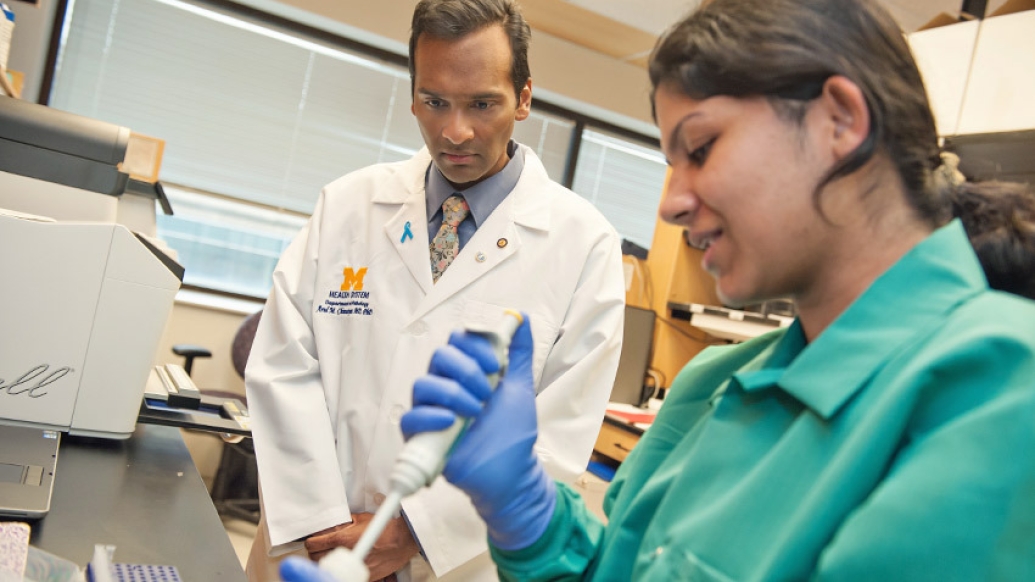A protein called PIKfyve impacts multiple processes involved in metabolism and cell death; blocking it is key to making immunotherapy work in prostate cancer.
11:00 AM
Author |

It's a scientific riddle tangled up in a complex web. How do you turn an immune cold cancer into one that responds to immunotherapy?
Researchers led by the University of Michigan Rogel Cancer Center started with a simple thread: an inhibitor that showed promise against metastatic castration-resistant prostate cancer cells. This is the most challenging type of prostate cancer – advanced disease that has become resistant to hormone-based treatment.
MORE FROM THE LAB: Subscribe to our weekly newsletter
From there, they continued to untangle the web to discover multiple levels of cellular processes that were preventing the immune system from mounting a response. Break past them with this inhibitor and suddenly what's considered an immune cold tumor turns red hot.
"Immunotherapy has dramatically improved outcomes for some types of cancer. But prostate cancers are typically immune cold, which means these patients have benefited little from immunotherapies. Finding a way to rev up the immune response would create tremendous opportunity to improve patient outcomes," said Arul M. Chinnaiyan, M.D., Ph.D., director of the Michigan Center for Translational Pathology and S.P. Hicks Professor of Pathology at Michigan Medicine. Chinnaiyan is senior author of the paper published in Nature Cancer.
Researchers started by screening a library of 167 inhibitors against prostate cancer cells. They found one, ESK981, had the most impact.
ESK981 is a class of drugs called multi-tyrosine kinase inhibitors, which are designed to hit multiple targets. This means it functions like a combination therapy, able to block cancer on more than one front. It was originally developed to check blood vessel growth and has already been tested in phase 1 clinical trials, which found it to be safe and well-tolerated.
In cell lines and mice with metastatic castration-resistant prostate cancer, researchers found ESK981 inhibited tumor growth.
SEE ALSO: New Connections Reveal How Cancer Evades the Immune System
"The response was intriguing, but we wanted to understand the mechanism at play with ESK981 in prostate cancer cells," Chinnaiyan said.
They discovered several cellular processes were occurring. First was the role of a type of cell death called autophagy. The authors surprisingly found that ESK981 was a potent inhibitor of autophagy in tumor cells. This caused the cancer cells to produce a protein called CXCL10, which led to recruitment of immune T cells to the tumor.
But there was one more layer to go. Ultimately, they traced it back to PIKfyve, a type of protein called a lipid kinase. The authors discovered that ESK981 directly targets PIKfyve, affecting these multiple processes involved in metabolism and cell death.
The researchers confirmed this by knocking down PIKfyve in cell lines and mice. They saw the same processes occur: tumors stopped growing, autophagy was controlled and more T cells were recruited to the tumor. When they added an immune checkpoint inhibitor to the PIKfyve knockdown, the impact was even greater, significantly reducing tumors.
"Overcoming resistance to immunotherapy is an urgent need in prostate cancer. PIKfyve is a promising target, especially combined with an immune checkpoint inhibitor. This combination has potential to extend the benefit of immunotherapy to patients whose tumors have previously not responded," Chinnaiyan said.
Based on these findings, researchers have begun phase 2 clinical trials using ESK981 alone or in combination with the immunotherapy nivolumab for metastatic castration-resistant prostate cancer.
Like Podcasts? Add the Michigan Medicine News Break on iTunes, Google Podcasts or anywhere you listen to podcasts.
Additional authors include Yuanyuan Qiao, Jae Eun Choi, Jean C. Tien, Stephanie A. Simko, Thekkelnaycke Rajendiran, Josh N. Vo, Andrew D. Delekta, Lisha Wang, Lanbo Xiao, Nathan B. Hodge, Parth Desai, Sergio Mendoza, Kristin Juckette, Alice Xu, Tanu Soni, Fengyun Su, Rui Wang, Xuhong Cao, Jiali Yu, Ilona Kryczek, Xiao-Ming Wang, Xiaoju Wang, Javed Siddiqui, Zhen Wang, Amelie Bernard, Ester Fernandez-Salas, Nora M. Navone, Stephanie J. Ellison, Ke Ding, Eeva-Liisa Eskelinen, Elisabeth I. Heath, Daniel J. Klionsky, Weiping Zou
Funding for this work comes from the Prostate Cancer Foundation Challenge Award, National Cancer Institute Prostate SPORE Grant P50CA186786, Department of Defense grant PC130151P1, National Institutes of Health grant GM131919. In addition, individual researchers are supported by NCI grant R35CA231996, Howard Hughes Medical Institute, A. Alfred Taubman Institute, American Cancer Society, PCF Young Investigator Awards, DoD Postdoctoral Award W81XWH-16-1-0195, and the Academy of Finland.
Disclosure: The University of Michigan has filed a disclosure on the findings based on this study. Chinnaiyan and Qiao are named as co-inventors. Esanik Therapeutics Inc. licensed ESK981 from Teva Pharmaceuticals. Chinnaiyan is a co-founder and serves on the scientific advisory board of Esanik Therapeutics Inc. Esanik Therapeutics or Teva Pharmaceuticals were not involved in the design or approval of this study, nor was this study funded by them.
Paper cited: "Autophagy inhibition by targeting PIKfyve potentiates response to immune checkpoint blockade in prostate cancer," Nature Cancer. DOI: 10.1038/s43018-021-00237-1

Explore a variety of healthcare news & stories by visiting the Health Lab home page for more articles.

Department of Communication at Michigan Medicine
Want top health & research news weekly? Sign up for Health Lab’s newsletters today!





